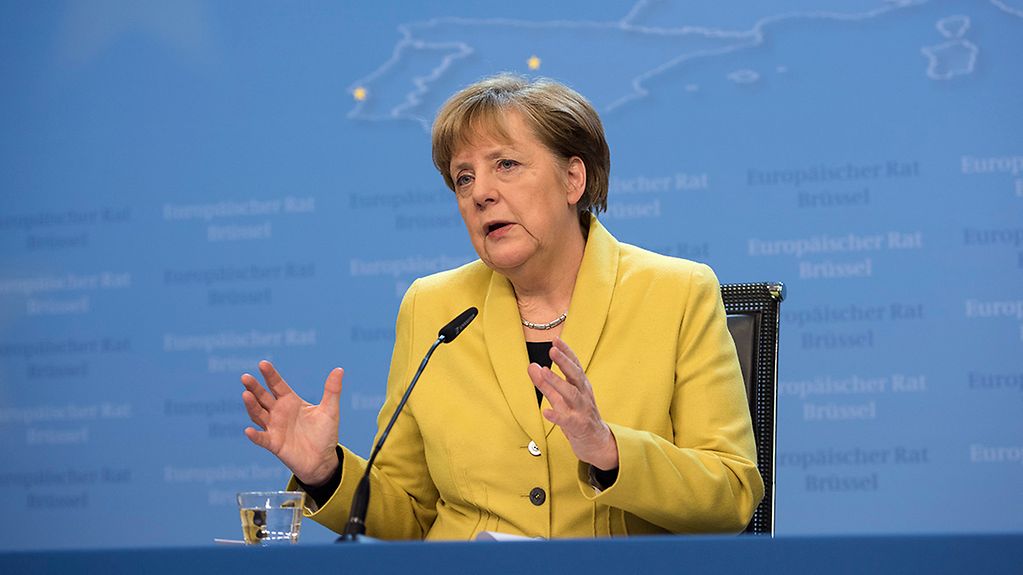EU-Council on the refugee crisis
The EU and Turkey have agreed that from 20 March onwards, refugees entering illegally from Turkey will be sent back. At the same time, the relationship with Turkey will be expanded. Europe has thereby demonstrated that it can overcome even the toughest of challenges, according to Chancellor Merkel.

Chancellor Merkel: Europe will also withstand this severe test.
Photo: Bundesregierung/Bergmann
“Today’s conclusion is that Europe will also manage to withstand this severe test, and it will do so together with all 28 member states, and in cooperation with Turkey,” said Federal Chancellor Angela Merkel, at the end of the two-day summit of European heads of state on the refugee crisis.
The EU and Turkey agreed in an historic statement that, in future, Turkey will take back all irregular refugees who travel to Greece. As the Chancellor announced after the negotiations, all applicable international standards will be upheld. “Each asylum application will be treated individually,” said Merkel. If, after investigation, it is determined that there are no grounds for asylum, then the asylum seekers will be sent back. This principle is already applicable as from 20 March.
Repatriations should commence on 4 April. In return, for each illegal Syrian returned to Turkey, a Syrian refugee will be legally resettled in the EU. In this regard, the EU will provide logistical assistance to Greece. The European asylum authorities and border protection authorities will be strengthened. The Chancellor promised “a significant contribution” from Germany.
Break the business model of the smugglers
It is the common goal of the EU and Turkey to hit the business model of the smugglers and traffickers hard and to destroy it, according to Merkel. “This agreement not only helps the refugees, but it is also an important contribution towards stopping smuggling and human trafficking, so that the external borders can be protected and the reasons for fleeing can be combated”.
Through the agreement, initially 72,000 refugees who have fled the civil war in Syria will be legally brought to Europe. As the Chancellor explained, the EU member states already agreed to accept 22,000 refugees from the states neighbouring Syria last year. So far, only 4,000 of these have been resettled. In addition, a further 54,000 people will have the chance to enter the EU legally. These form part of the agreement to resettle 160,000 refugees within the EU on an equitable basis.
Implement action plan with Turkey
The EU agreement also strengthens the relationship between the EU and Turkey as well. Key goals include rapid visa liberalisation, and further financial support for the country, in which nearly three million Syrian refugees have sought shelter.
In order to lift the visa requirements from June onwards, Turkey must fulfil the conditions prescribed by the visa road map by the end of April, explained the Chancellor. Disbursement of the already-approved three billion Euros for the Syrian refugees in Turkey must also be sped up, for projects related to health, education, infrastructure, food and other living costs. “We will then make another three billion available by the end of 2018.”
In addition, Chapter 33 of the negotiations on the Turkey EU accession process will be opened. This relates to budget matters.
Legal basis for negotiations with Turkey
Before the EU-Turkey negotiations, the EU Commission presented a six-point plan. Its main focus was on legal issues and procedural issues. The repatriation of all new irregular migrants and asylum seekers arriving in the Greek islands from Turkey must take place in full accordance with European and international law.
A big component of the discussions was the legal basis for the negotiations with Turkey, according to the Chancellor. The desire for visa liberalisation also means that international legal standards must be adopted in Turkish law, continued Merkel. In order to implement visa-free travel for Turkey, Turkey must also introduce legal steps affording international protection to refugees.
Negotiations on Turkey's EU accession have been in progress since 2005. They are conducted without prejudging their outcome. Parallel to the signing of the EU-Turkey readmission agreement, the EU Commission started a dialogue with Turkey on 16 December 2013 regarding visa liberalisation. At the EU-Turkey summit on 29 November 2015, there was already agreement on accelerating the goals of the road map with all participating member states. Visa-free travel should have been in place from October 2016, but will now come be brought forward to the end of June. This is subject to Turkey fulfilling all the requirements of the road map on time.
Improve the humanitarian situation in Greece
The European Council has also addressed the situation in Greece, and made funds available to improve the accommodation provided to refugees.
The Chancellor urged the refugees from Idomeni to move to other accommodation being offered by the Greek authorities. She emphasised that the decisions of the European Council were aimed at helping the refugees.
The start of the NATO mission in the Aegean was also highlighted. This should be expanded, to prevent new migrant routes over the ocean. Libya requires special attention in this regard. Therefore, the EU supports a government of national unity in order to stabilise the country.
Maintain the competitiveness of Europe
On the first day of consultations, the heads of state also discussed economic matters. As the Chancellor disclosed, general conclusions were made on jobs, growth and competitiveness in Europe.
A big role was “played by the worrying situation in the steel industry,” according to Merkel. For the modern steel industry is one of the key pillars of Europe as an industrialised and innovative location.
The crisis in agriculture was also discussed, particularly the development of milk prices. At the European Council meeting in June, the focus will be on the progress made on the road to completing the economic and currency union.